
 |
||||
|---|---|---|---|---|
| Volume 50 Number 30, August 8, 2020 | ARCHIVE | HOME | JBCENTRE | SUBSCRIBE |
Workers' Weekly Internet Edition: Article Index : ShareThis
Defend the Rights of Health Workers! Defend the Rights of All!
Workers' Forum:
Threat of Mass Unemployment with Ending of FurloughReparations Rebellion Protests:
Huge Crowds at Brixton Reparations Day March and Rally, 1st August 2020International News:
Demonstrations in Britain against Indian Government Suppression of Kashmiri People
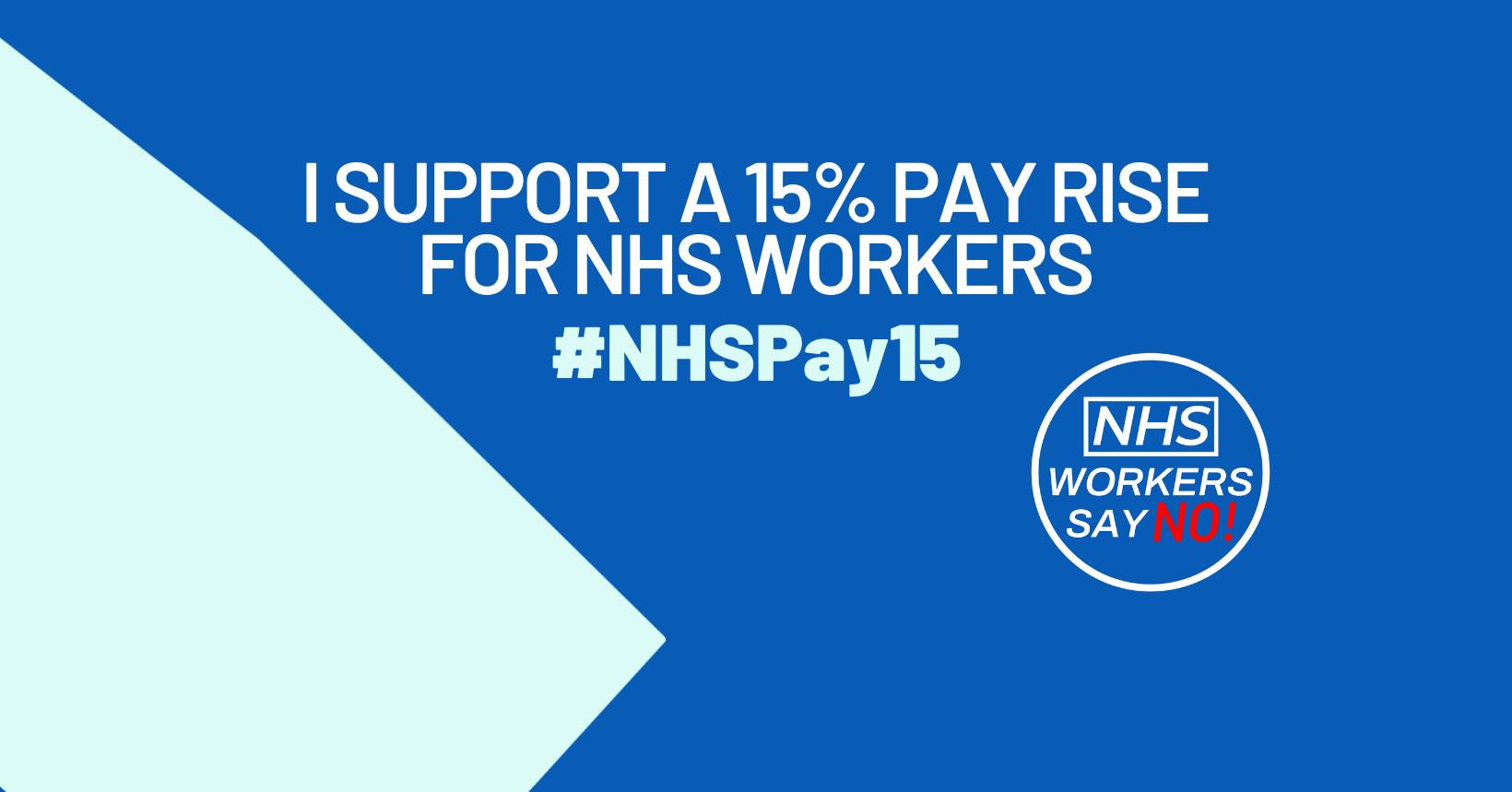
Today, August 8, NHS workers are on the march to defend their dignity and to speak out loud and clear that public sector pay inequality is not acceptable. Their central demand is for a 15% increase in the level of pay that has been kept suppressed for a decade. They are clear that the whole future direction of the NHS is at stake, and there must be no return to the so-called "business as usual". Dozens of events are being organised across England, Scotland and Wales.
We are posting below the statement of the Save South Tyneside Hospital Campaign (SSTHC) on this occasion.
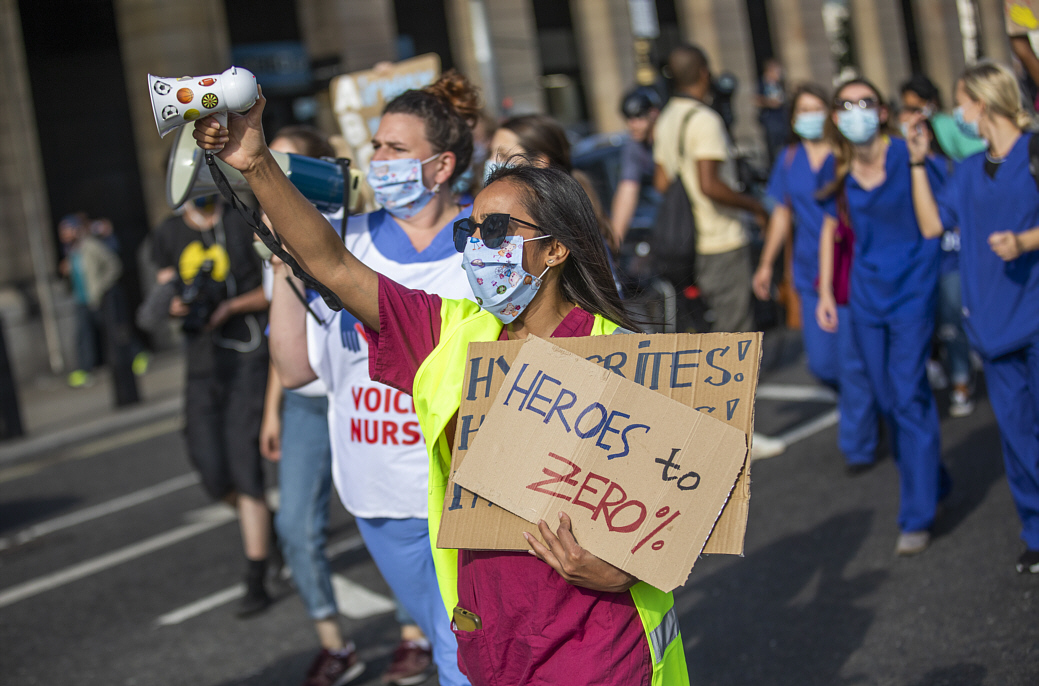
On Saturday, August 8, nurses and healthcare workers, supported by health campaigners and many other supporters, will hold a physically-distanced march from the Royal Victoria Infirmary through Newcastle for a rally at the Monument. This is part of nationwide protests by nurses and healthcare workers throughout the country in some 30 cities and towns.
This follows on from Wednesday, July 29, when thousands of nurses and other care and health workers marched through London to Downing Street demanding a wage rise and a stop to the attacks on the NHS, with the organisers of the demonstration demanding "No! to public sector inequality and pay justice."
Nurses and other health workers are speaking in their own name and taking up the fight, both to improve their own pay, and at the same time to take part in the struggle to safeguard the future of the NHS and care services.
Since the hypocrisy of Boris Johnson and the government has been exposed in clapping health and care workers one day and omitting them from a wage rise the next, nurses have been expressing their anger on social media and in other forums. Now they are taking to the streets, supported by doctors and others, in a series of marches and demonstrations.

In our discussions, SSTHC highlighted statements of very angry nurses that showed it was not just about the pay but the whole neglect of the welfare of all health staff. At the same time, they have had to endure constant attacks on the NHS, increased privatisation, staffing cuts, the cutting of student nurse bursaries and the promotion of commercialisation being put above patient care. Also discussed was that health workers are struggling from the imposition of austerity, as are so many people, both working and unemployed. Some health workers are having to use food banks to eat, and struggling to pay their bills after years of real-terms pay cuts finished off by a disastrous three-year low pay deal that again left many more experienced nurses worse off. Nurses have lost as much as 20% of their pay in real terms over the last 10 years. This has driven many to leave, unable to endure the stress of attempting to deliver patient care to the level they know should be offered to all as o f a right.
Right from the beginning, nurses, care workers and others in many different groups have made it clear that they support those in public service receiving a wage increase, and they also know that many of these services are also being cut to fund so-called "wage rises". They have also expressed opposition to the Trade Bill and other attacks on the NHS by the government. This is a government that has used the Covid-19 crisis to further line the pockets of private health monopolies and other private companies such as Serco and Deloitte, whilst continuing with planned closures to hospitals and A&Es, together with downgrading services throughout the crisis. These are services that are vital in delivering healthcare to the people, the downgrading of which had resulted in many unnecessary deaths.
What this new upsurge of nurses and care workers reflects is that what is being done to undermine their pay and conditions and the NHS is certainly not in their name. As one experienced nurse who had worked through the Covid-19 crisis put it in our SSTHC discussion: "The nurses and other care workers are now speaking out in their name for a new future that upholds and guarantees their well-being as part of guaranteeing the right of all to healthcare at the highest standard society can achieve. This is not some future dream. This is what the authorities should address now, and nurses and healthcare workers should be empowered to make the decisions in the future for a new, human-centred healthcare system for our NHS, our hospitals, our community and mental health services, and our workplaces."
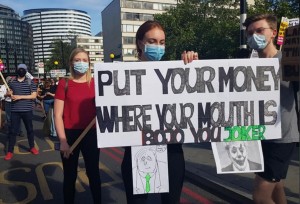
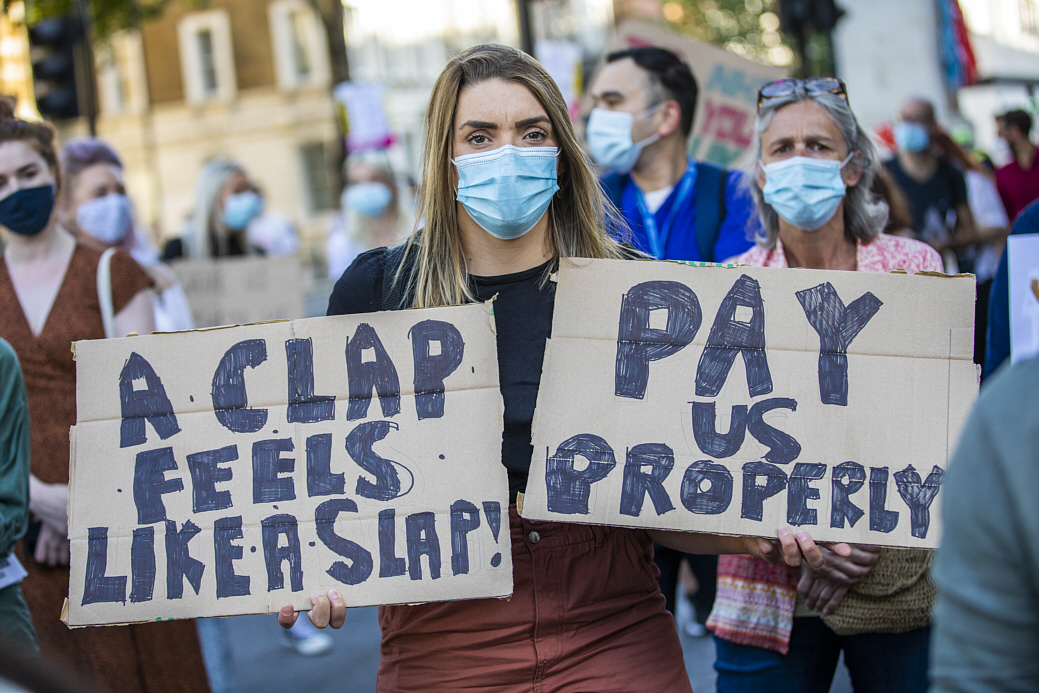
***
For a list of events and further information see:
https://keepournhspublic.com/event/nationwide-nhs-workers-say-no-no-to-public-sector-pay-inequality/
https://healthcampaignstogether.com/NHSpay.php
No to Unemployment! Defend the rights of all!

It is becoming increasingly apparent that, when the furlough scheme ends in October, mass redundancies are in the offing. This is already happening in various sectors, particularly in the steel, automotive, aviation, and connected industries.
The Coronavirus Job Retention Scheme, which allows firms to furlough employees with the government paying 80% of their wages up to a maximum of £2,500, was originally open for three months. Opposition, and the developing seriousness of the wave of the pandemic in Britain, led to the scheme's extension to October. Since June 30, apart from certain exceptions, the scheme has been closed to new people. Further, many employees have already been having to return to work over the past three months despite the still-present danger of the pandemic.
Now that the scheme is to end, a potentially huge number of workers are to find their status change from retention under the scheme to unemployment, facing a massive reduction in income as they are forced from furlough and into Jobseeker's Allowance. It is reported that some 9 million people are currently on furlough.
Large employers undertaking a statutory consultancy period with their staff
on redundancy arrangements will soon begin - in fact, already are - issuing
redundancy notices to what could therefore be millions of people. Some are
saying
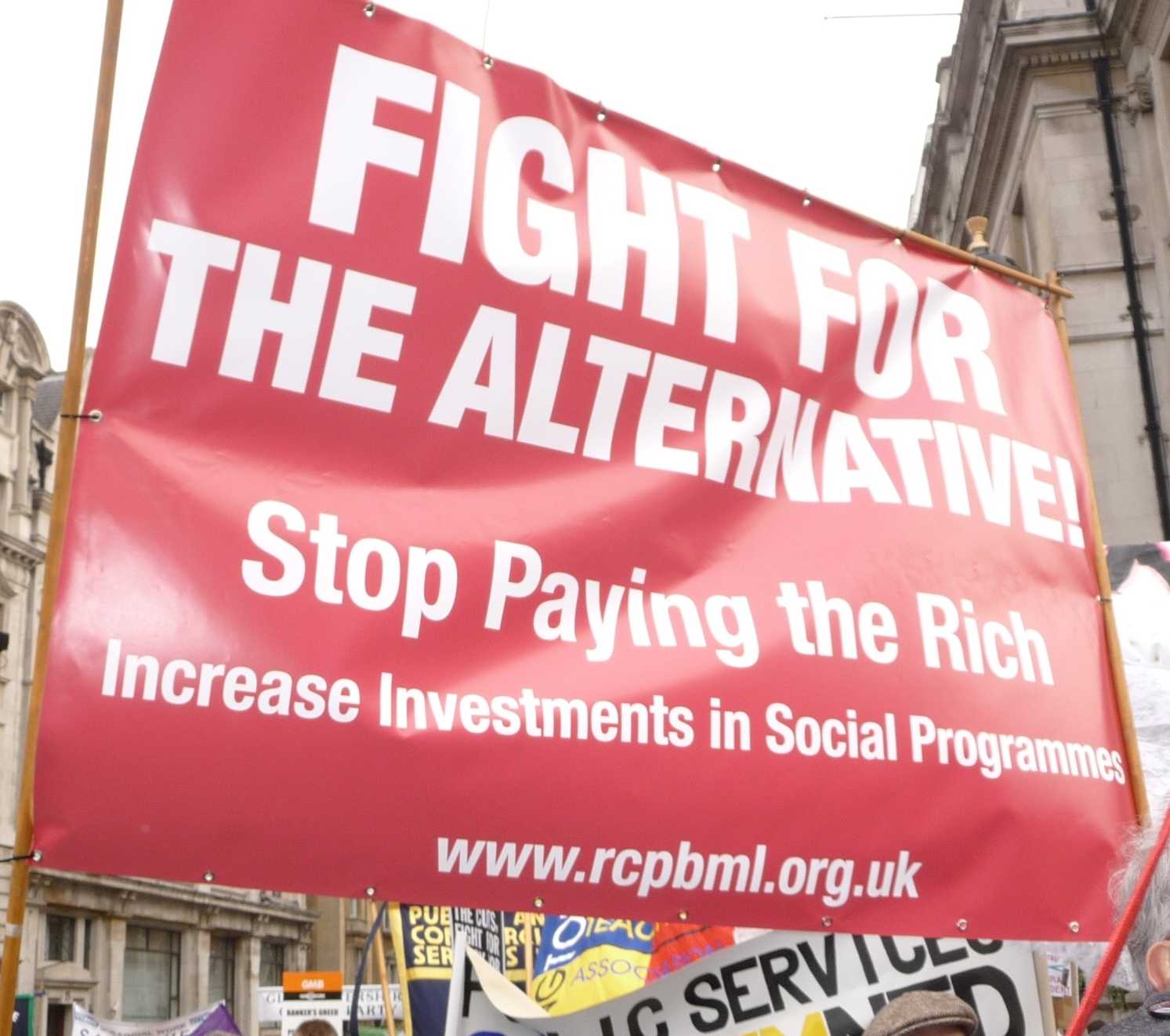 that what
have effectively been artificial numbers of employees on companies' books are
to become officially unemployed when the furlough scheme ends. This wholesale
change of status potentially represents a step deterioration in the condition
of the workers as a whole.
that what
have effectively been artificial numbers of employees on companies' books are
to become officially unemployed when the furlough scheme ends. This wholesale
change of status potentially represents a step deterioration in the condition
of the workers as a whole.
The threat of an impending wave of mass unemployment is throwing into stark relief the issue of who controls the direction of the economy, which includes the decisions made in large companies over redundancy. Workers should have a decisive say as to when furlough ends. The perspective must be that it is their economy and they should be the decision-makers.
Workers, organised in trade unions and workplace organisations, and faced with this crisis, must turn the situation around. All who are not working should maintain their status and dignity as unemployed workers, and they too should become organised.
The mass of unemployed will inevitably face shortages in necessities for life, lacking adequate income for food, clothing and shelter. To be reduced to reliance on foodbanks and charity, affecting their health and dignity, is a violation of their most basic human rights. To maintain their dignity and survival, they must not be faced with police powers to restrict their abilities to organise. They must be united against divisive tactics to limit their resistance and activity. They cannot be restricted by the conditions. United action is required to put the government on notice that plans should be made for providing positive employment and adequate standards of living.
Workers are already showing their capabilities on all fronts. The urgent necessity is to continue to speak out and strengthen their organisations to oppose unemployment and fight for the rights of all.
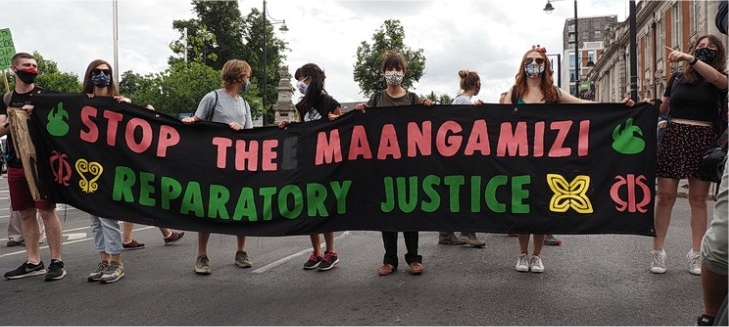
Afrikan Emancipation Day is observed on 1st August. Since 2014 it has been the occasion for an annual Afrikan Emancipation Day Reparations March.
Brixton was once again the starting point for Saturday's march, which was organised by the Stop The Maangamizi Campaign and the Afrikan Emancipation Day Reparations March Committee to demand reparations as a start to the process of repairing the vast damage to human beings and their natural and social environment by the enslavement of Africans over centuries. "Maangamizi" represents the continuing mass destruction caused by the enslavement of African people.
This year, the event assumed greater significance in the context of the upsurge against racism and colonialism, and the hypocrisy of the government in paying lip service to Black Lives Matter, while still glorifying its colonial history and the monuments to that history, and pursuing a racist agenda today which attempts to divide the people and to counter the movement to defend the rights of all. Workers' Weekly adds its voice to the demand for reparations.
We are reproducing here some of the photos from the 1st August march. It went from Clapham Common to Windrush Square in Brixton, where there were speakers, stalls and live performances, followed by a march through central Brixton.
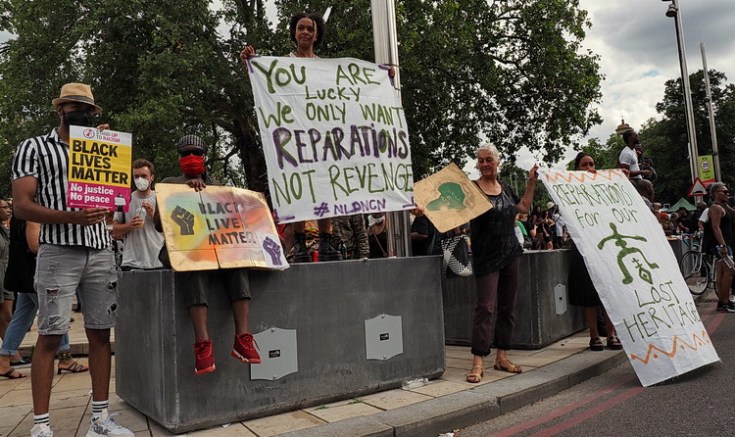
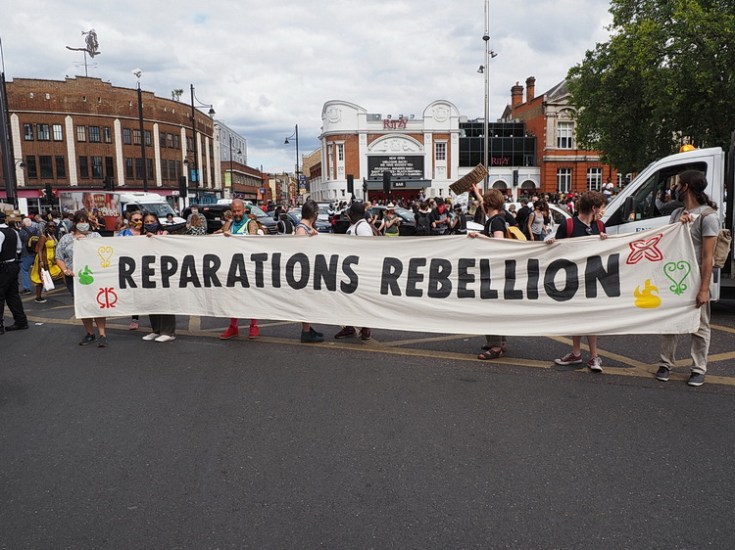
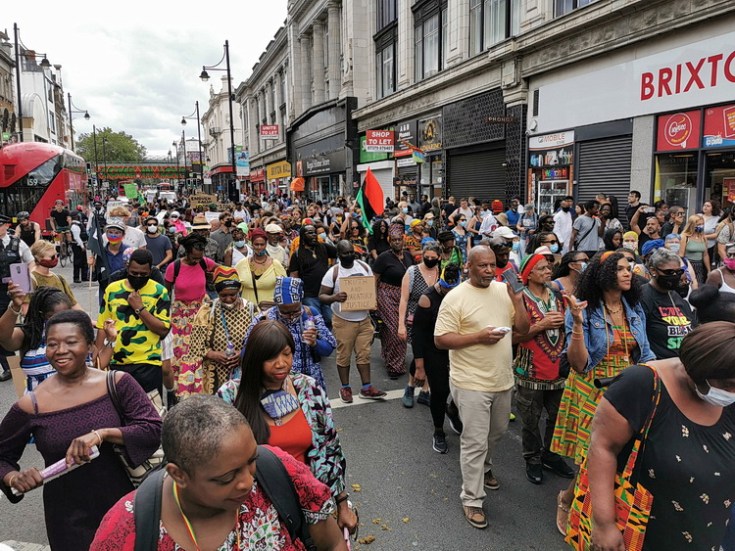
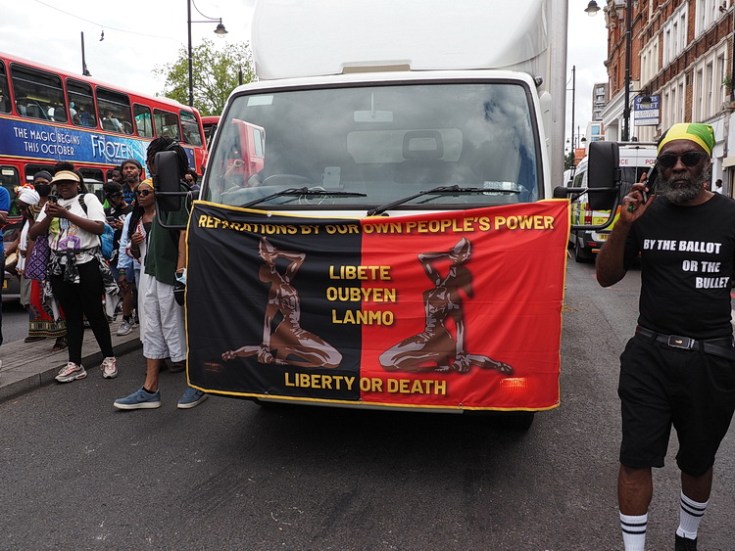
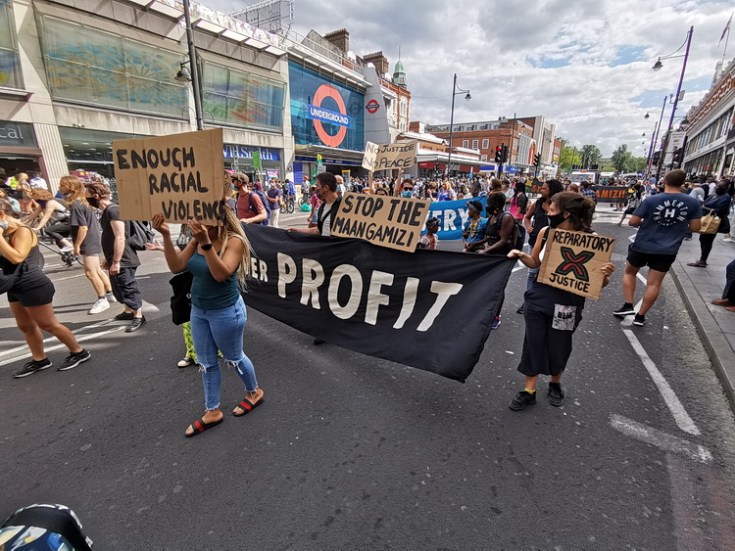
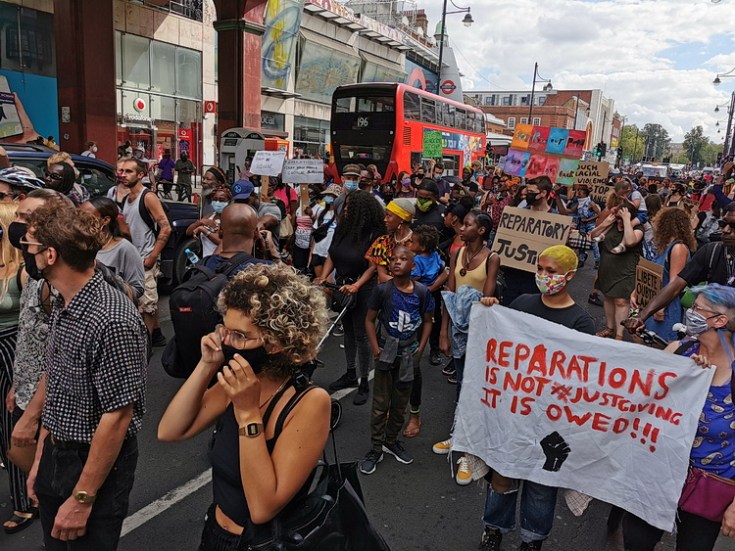
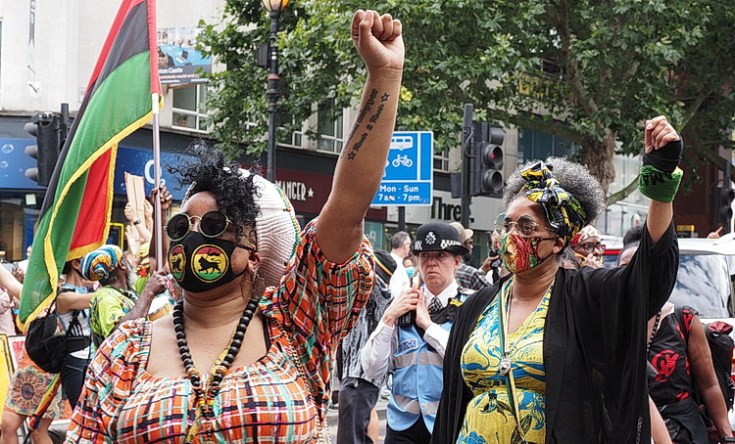
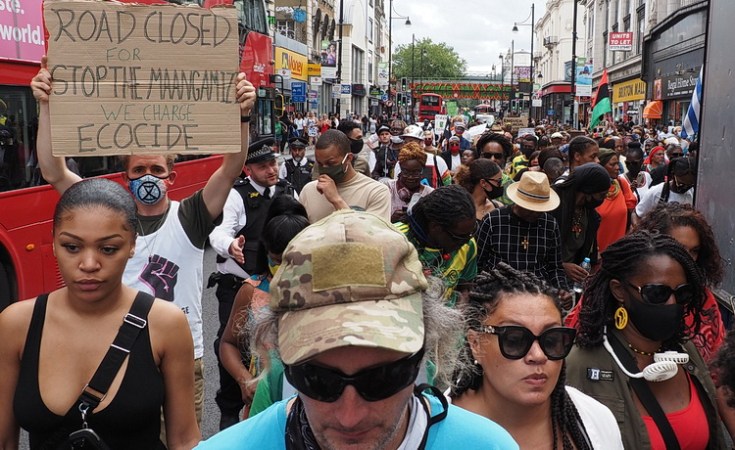
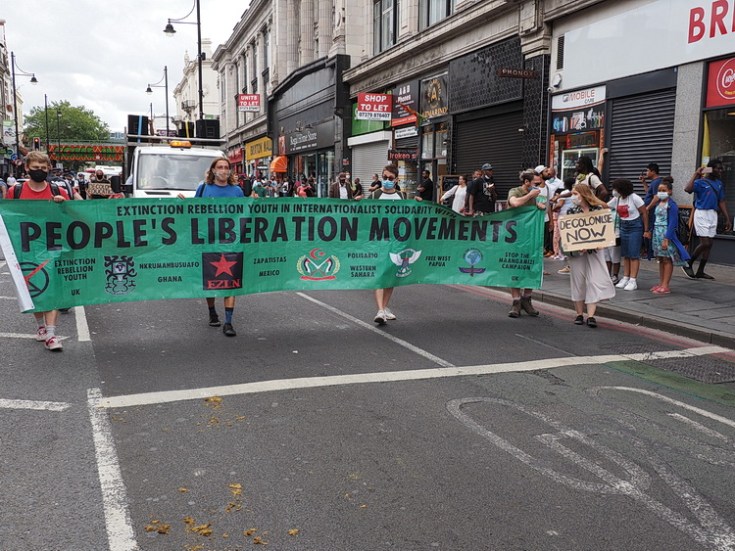
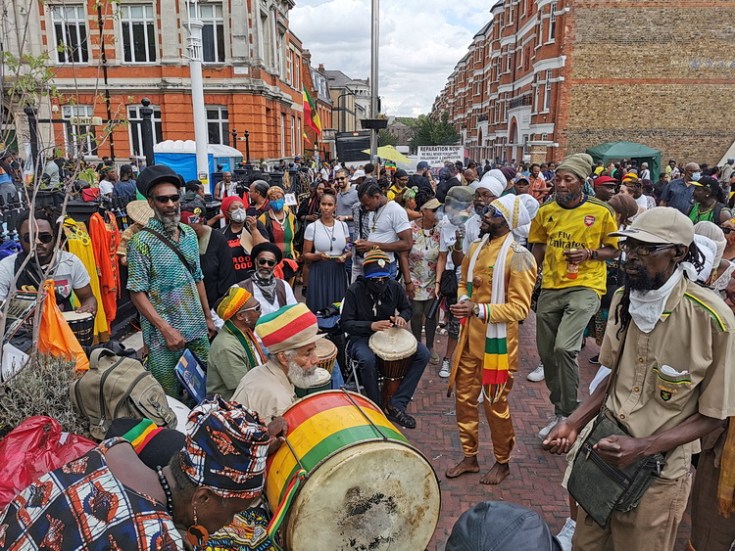
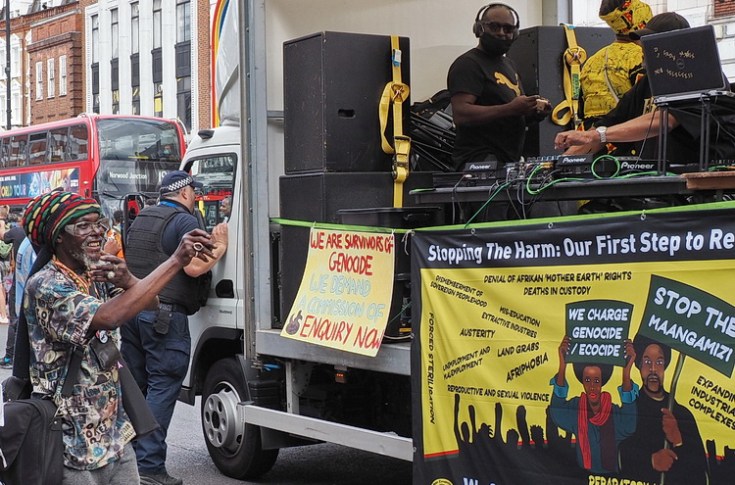
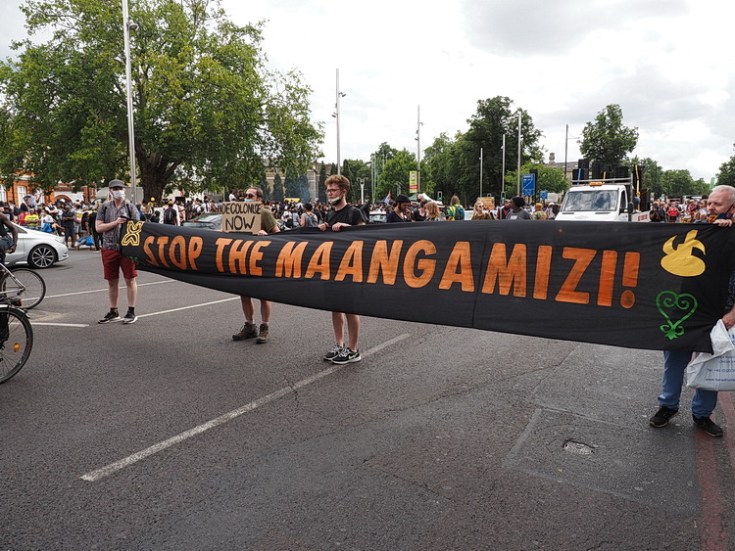
For further background, see Workers' Weekly of August 1:
http://www.rcpbml.org.uk/wwie-20/ww20-29/ww20-29-09.htm
(Photos: Brixton Buzz)
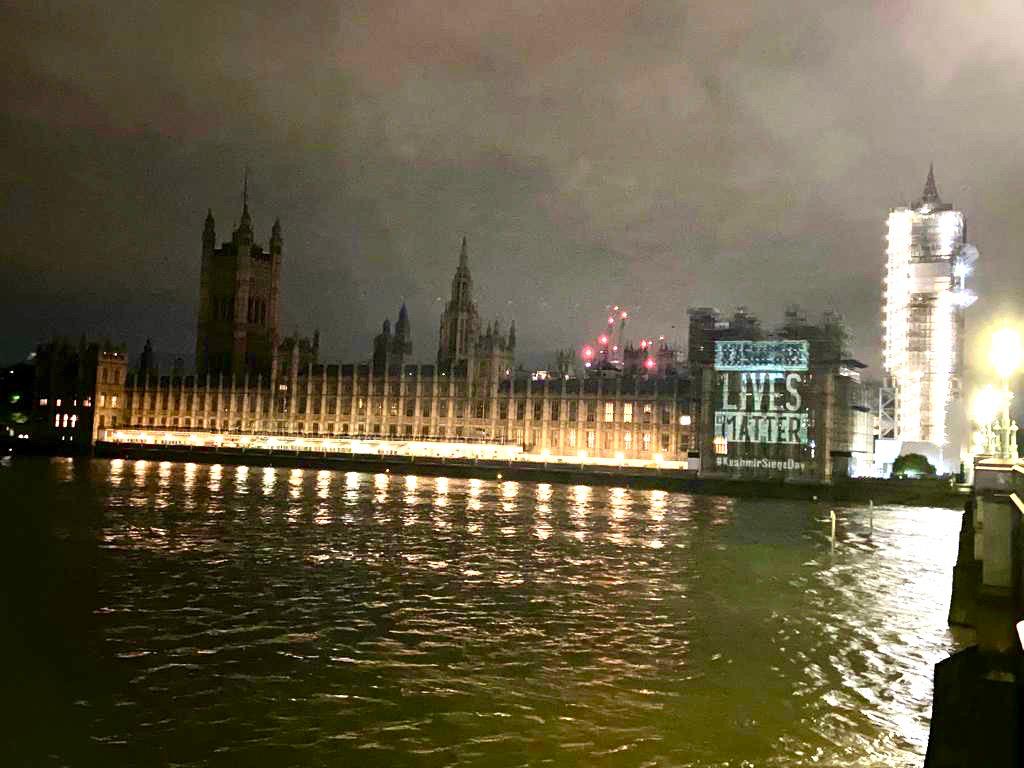
August 5, 2020, marked the first anniversary of the revocation of Jammu and Kashmir's special status under Article 370 of the Indian constitution. This meant that the Indian government abruptly changed the semi-autonomous nature of India-controlled Kashmir, imposing a media lock-down and a curfew. The move was met with widespread international criticism. The Indian government had previously enacted the Armed Forces Special Powers Act in 1990, which had been invoked to arrest, search and destroy property, and kill with impunity. In Kashmir, prior to the first anniversary, authorities imposed on curfew on the the city of Srinagar on August 3 with immediate affect until the anniversary itself, marked as a "Black Day" by the people.
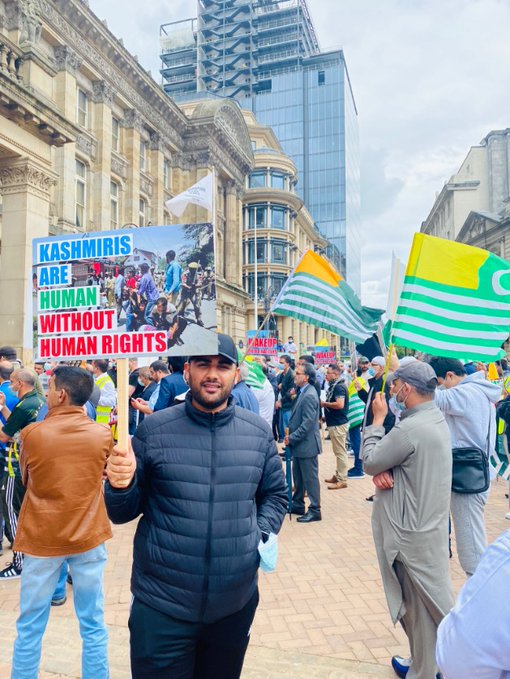
On Wednesday, August 5, to oppose the Indian government's suppression and lock-down of the Kashmiri people, which amount to a siege of Jammu and Kashmir, demonstrations were held in Britain outside the Indian High Commission in London, and the Council House in Birmingham, a city where 150,000 Kashmiris live. Hundreds of Kashmiris participated in these two significant actions.
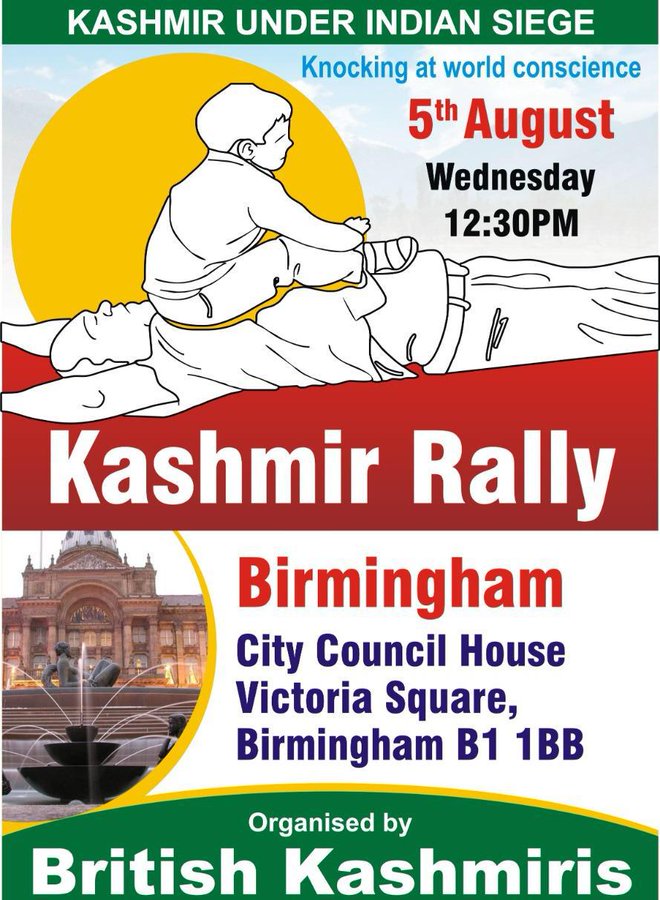 The Kashmir people
themselves have been asserting their right to self-determination for many
decades, dating back to the partition of India in 1947, in which the British
state played such a nefarious role. An important demand in the present
situation is that the people of Jammu and Kashmir must be allowed to settle the
Kashmir issue through a fair, transparent and democratic referendum under the
auspices of the United Nations, as required by UN resolutions.
The Kashmir people
themselves have been asserting their right to self-determination for many
decades, dating back to the partition of India in 1947, in which the British
state played such a nefarious role. An important demand in the present
situation is that the people of Jammu and Kashmir must be allowed to settle the
Kashmir issue through a fair, transparent and democratic referendum under the
auspices of the United Nations, as required by UN resolutions.
Large numbers of Indian troops have contributed to the suppression of the movement of the people of Kashmir for independence. The leadership of the movement has been incarcerated, and new psychological methods of disorientation and oppression are being applied. There have been a massive number of arrests in Kashmir, together with the violence of the Indian military against the people. The Sino-Indian confrontation has also added to the already fraught situation in Kashmir. Furthermore, thousands of Indian workers without Covid-19 tests are being brought into Jammu and Kashmir for work and settlement by the Indian government, demonstrating how Indian Prime Minister Narendra Modi is in a hurry to obliterate the identity and heritage of Kashmir. It is reported that over 19,000 cases of the disease have been recorded in Kashmir.
Workers' Weekly stands with the people of Kashmir in their struggle for self-determination. The oppressed people of Kashmir are bound to continue their march for freedom, justice and democracy until victory.
Receive Workers'
Weekly E-mail Edition: It
is free to subscribe to the e-mail edition
We encourage all those who support the work of RCPB(ML) to also support it
financially:
Donate to
RCPB(ML)
Workers' Weekly is the weekly on
line newspaper of the
Revolutionary Communist Party of Britain (Marxist-Leninist)
Website:
http://www.rcpbml.org.uk
E-mail:
office@rcpbml.org.uk
170, Wandsworth Road, London, SW8 2LA.
Phone: 020 7627 0599: